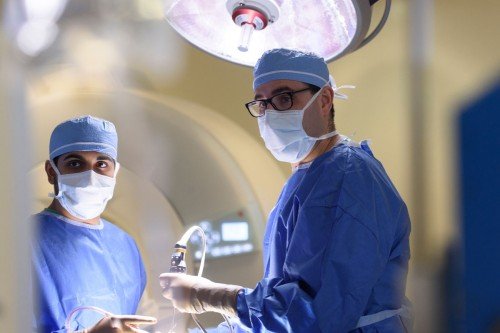Thyrotropinomas are pituitary adenomas that occur in the thyrotropic cells of the pituitary gland and secrete thyroid-stimulating hormone, or TSH. TSH, in turn, triggers the thyroid gland to become overly active and produce too much thyroid hormone, a condition known as hyperthyroidism.
A TSH-producing tumor is one of the rarest types of pituitary tumors. While hyperthyroidism has a number of causes, Grave’s disease being among the most common, very few cases of hyperthyroidism are linked to pituitary tumors.
TSH-Secreting Pituitary Adenomas Symptoms
The symptoms of a TSH-secreting pituitary adenoma are the same as those of hyperthyroidism. These may include:
- rapid heart rate
- tremors
- unexplained weight loss
- increased appetite
- feeling too warm or hot
- trouble falling asleep
- anxiety
- frequent bowel movements
- a lump in the front of the neck due to an enlarged thyroid gland
TSH-Secreting Pituitary Adenomas Diagnosis
TSH-producing pituitary tumors are diagnosed using blood tests that look for abnormal amounts of TSH and thyroid hormone.
You may also need to have an MRI scan of the brain, where the pituitary gland is located, to determine the exact size and location of the tumor.
TSH-Secreting Pituitary Adenomas Treatment
The primary treatment for a TSH-secreting pituitary adenoma is surgery to remove the tumor.
Memorial Sloan Kettering surgeons are experienced in using a minimally invasive approach called transsphenoidal surgery to remove pituitary tumors. The approach allows our surgeons to bypass brain tissue, operating instead through an incision inside the nasal passage. The risk for neurologic complications with this technique is very low, and the surgery leaves no visible scar.
In the rare case that a tumor is too large to be removed using transsphenoidal surgery, our surgeons may recommend a craniotomy, a procedure in which the tumor is removed through an incision made in the front of the skull.
Sometimes large tumors (macroadenomas) can be difficult to cure with surgery alone and may require additional therapy, such as radiation therapy.
Radiation Therapy for TSH-Secreting Pituitary Adenomas
Radiation therapy can be used in several ways for a TSH-secreting pituitary adenoma. It may be recommended as additional therapy after surgery to prevent regrowth of the tumor. Radiation may also be used as the sole treatment if the tumor cannot be removed surgically, or if the tumor regrows after surgery.
The radiation therapy team at MSK is highly experienced in caring for people with thyrotropinomas, and works closely with the other members of your care team. They have access to every form of modern radiation therapy available and will customize a treatment plan so precise that it factors in the size and shape of your tumor to the millimeter.
Their goal is to not only eliminate the tumor cells but to prevent the side effects of treatment by keeping the healthy cells around the tumor safe.
We offer several radiation therapy options for people with a thyrotropinoma. Learn more about our approach to radiation therapy for pituitary tumors.
Monday through Friday, to (Eastern time)



